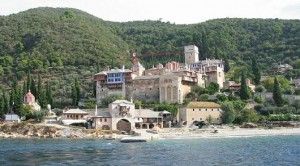Wednesday

Those Crazy Greeks!
Musings: Government has an impact on society, which is why you want to limit government. Due to human cupidity, it's impossible to imagine any expansive government that doesn't have an adverse effect on society and culture. In America, I believe democracy has shortened our time preference. We spend now, not thinking about the future, just like politicians who look no further than the next election. I also believe violence is related to expansive government. All government is coercive at some level. Modern government and its expansiveness is violent at root. The violence spills over as society picks up the signal.
What prompted the musings:
The Greek state was not just corrupt but also corrupting. Once you saw how it worked you could understand a phenomenon which otherwise made no sense at all: the difficulty Greek people have saying a kind word about one another. Individual Greeks are delightful: funny, warm, smart, and good company. I left two dozen interviews saying to myself, “What great people!” They do not share the sentiment about one another: the hardest thing to do in Greece is to get one Greek to compliment another behind his back. No success of any kind is regarded without suspicion. Everyone is pretty sure everyone is cheating on his taxes, or bribing politicians, or taking bribes, or lying about the value of his real estate. And this total absence of faith in one another is self-reinforcing. The epidemic of lying and cheating and stealing makes any sort of civic life impossible; the collapse of civic life only encourages more lying, cheating, and stealing.
That's from this entertaining article by atheist Michael Lewis, who traveled to Greece to explore the Greek crisis. Excellent piece. Much of it centers on Mt. Athos, which some people consider the epicenter (or at least poster child) of Greece's problems. For my Eastern Orthodox readers, you'll find the Athos angle especially interesting. Lewis, in my opinion, treats them well.
Interesting passage about his trip out to Athos:
The ferry chugs for three hours along a rocky, wooded, but otherwise barren coastline, stopping along the way to drop monks and pilgrims and guest workers at other monasteries. The sight of the first one just takes my breath away. It's not a building but a spectacle: it's as if someone had taken Assisi or Todi or one of the other old central-Italian hill towns and plopped it down on the beach, in the middle of nowhere. Unless you know what to expect on Mount Athos–it has been regarded by the Eastern Orthodox Church for more than a millennium as the holiest place on earth, and it enjoyed for much of that time a symbiotic relationship with Byzantine emperors–these places come as a shock. There's nothing modest about them; they are grand and complicated and ornate and obviously in some sort of competition with one another. In the old days, pirates routinely plundered them, and you can see why: it would be almost shameful not to, for a pirate.
Bonus quote from same article: "Athens somehow manages to be bright white and grubby at the same time. The most beautiful freshly painted neoclassical homes are defaced with new graffiti. Ancient ruins are everywhere, of course, but seem to have little to do with anything else. It's Los Angeles with a past." Link.
